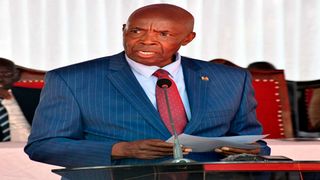
Cabinet Secretary for Education Ezekiel Machogu.
| File | Nation Media GroupEducation
Premium
MPs to Knec: You must do this to curb exam cheating
Members of Parliament have told Education Cabinet Secretary Ezekiel Machogu to ensure the forthcoming exams are credible by sealing all loopholes that can lead to cheating.
The lawmakers on Wednesday, October 25 expressed concern that cheating has become a norm in national exams thereby eroding the value of academic certificates.
Among the issues the MPs want fixed in order to tame cheating include payment of examiners and security officers manning the exams in time, disbursement of school capitation in time to ensure the environment where exams are undertaken are well equipped.
The MPs also want fees paid to teachers marking the exams to be increased to act as a morale booster. In addition, they want the number of markers increased to ensure they give more attention to the scripts.
The lawmakers are also opposed to candidates being transported to examination centres far from their schools, urging the ministry to establish more examination centres near schools.
The MPs also want the Directorate of Criminal Investigations (DCI) and Communication Authority (CA) to act swiftly against those who peddle examination papers on social media platforms.
The rehearsals for the Kenya Primary School Education Assessment (KPSEA) and the Kenya Certificate of Primary Education (KCPE) are scheduled for tomorrow while the exams will run from Monday to Wednesday next week.
The Kenya Certificate of Secondary Education (KCSE) practicals started on October 19 and were concluded on October 23 while the theories are set to begin on Monday to November 24.
A total of 3,604,972 candidates are registered for the exams this year. This number includes 903,260 students who will sit KCSE exams, 1,415,315 (KCPE), 1,282,574 (KPSEA) and 3,383 will sit the Kenya Intermediate Level Education Assessment (KILEA).
While discussing the measures put in place by the ministry, MPs termed the responses by Mr Machogu as ‘nothing new’.
Ugenya MP David Ochieng decried that in the past two years, there has been increased cases of exam cheating.
“We have had all these things that the Cabinet Secretary is telling us such as exams being airlifted, using police and many others, but exams are still stolen... we want an assurance that things will be different this year,” Mr Ochieng said.
National Assembly Education committee chairman Julius Melly said the committee had recommended that examination papers should be collected at once because they found out that the second paper is the most leaked due to early exposure.
“If we as a country cannot make sure that our certificate is valued, then we cannot stand proudly in the community of nations,” Mr Melly said.
Endebes MP Robert Pukose said it is time the Ministry of Education addresses the issue of examiners pay once and for all to facilitate easy supervision of exams.
“During the late 80s and early 90s, there was no form of cheating in our exams but nowadays cheating is the norm,” Dr Pukose said.
Marakwet West MP Timothy Toroitich said the ministry should ensure that all loopholes are sealed to guarantee that certificates issued to students have value.
Machakos Woman Representative Susan Kiamba said cheating will always thrive if examiners are not paid on time, hence the ministry should address the payment problem as highlighted by several players in the sector.
About six years ago, the government reformed administration of national exams by adopting a multi-agency approach. Instead of the Ministry of Education solely overseeing the exercise, the Interior and ICT ministries were roped in as critical partners to improve the credibility of the results.
A report by the National Assembly Education committee on last years’ exams revealed that there were many malpractices which were perpetuated through the use of technology.





